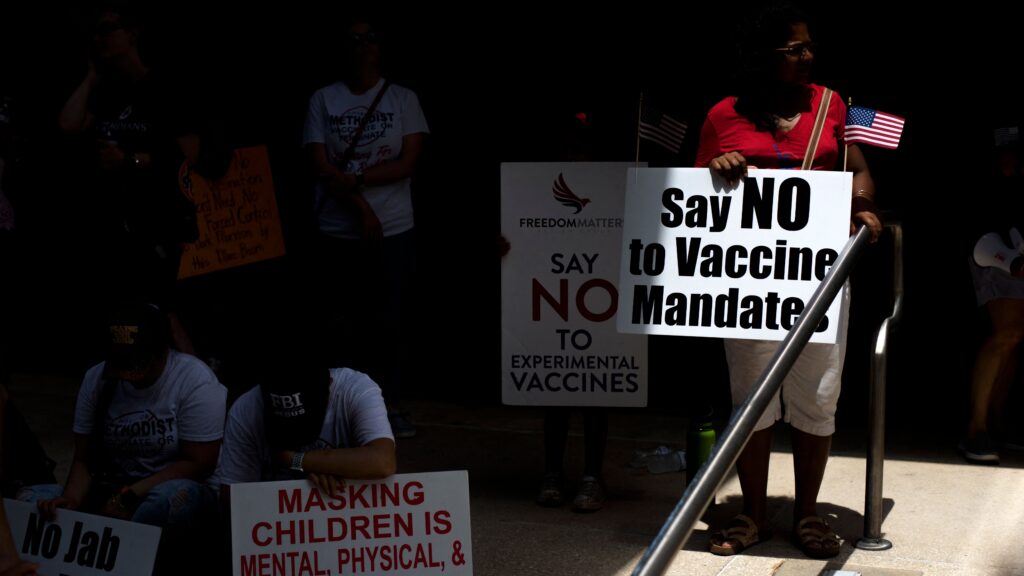Health
Physician Attends Anti-Vaccine Conference, Urges Colleagues to Engage

As public health debates intensify, a physician recently participated in the Children’s Health Defense (CHD) conference in Austin, Texas, where discussions centered on the anti-vaccine movement. Dr. Craig Spencer, a public health professor and emergency medicine physician, attended the event to explore the appeal of this movement and the motivations behind its fervent supporters.
The conference, held in early March 2024, gathered nearly 1,000 attendees, many of whom identified with the anti-vaccine ideology. Throughout the two-day event, Spencer encountered numerous individuals sharing personal stories of loss and grievance, often transformed into a collective mission against vaccination policies. For Spencer, the experience was an eye-opener; he believed that more public health professionals should engage with such communities to better understand their perspectives.
The CHD, founded less than a decade ago, has gained momentum under the leadership of its new secretary, Robert F. Kennedy Jr.. During the opening panel, Del Bigtree, the CEO of the Informed Consent Action Network, asserted that the movement was thriving, urging attendees to remain vigilant and proactive. “If too many of us get careful, we will all be in prison,” Bigtree warned, reflecting the urgency felt by many at the gathering.
Speakers at the conference emphasized a dual narrative of triumph and threat, underscoring the need to maintain momentum in their campaign against vaccines. The event’s title, “A Moment of Truth,” captured this essence, as participants celebrated perceived victories while also recognizing the potential setbacks they could face in the future.
Among the notable figures present, Gavin de Becker, who provided security for Kennedy’s presidential campaign, openly embraced the anti-vaccine label, stating, “Ich bin ein antivaxxer.” This sentiment resonated with attendees, who responded with enthusiasm as speakers criticized the influence of pharmaceutical companies and the federal government.
The CHD conference was characterized by a strong sense of community among participants. Despite the absence of open discussions or Q&A sessions, the attendees exhibited a unified purpose. Many expressed their concerns regarding vaccine safety and broader issues of “medical freedom.” A key takeaway from Spencer’s observations was the identity that bound the participants together—a shared experience of ostracization and a commitment to speak out against what they perceive as injustices.
While the conference lacked robust scientific data to support its claims, it compensated with compelling narratives and emotional appeals. One poignant moment occurred when Peter Hildebrand shared the story of his unvaccinated daughter who died from measles during a recent outbreak. His heartfelt tribute encapsulated the personal stakes involved in the anti-vaccine movement.
Strategically, the CHD appears to be focused on legislative action. An analysis by the Associated Press revealed that over 420 anti-science and “medical freedom” bills have been introduced across various state legislatures in the U.S. The conference speakers indicated that this legislative push is just the beginning, as they aim to reshape public health policy in their favor.
Notably, the movement has garnered support from influential politicians, including Sen. Rand Paul and Sen. Ron Johnson, who have publicly endorsed changes to vaccine policies. This alignment with lawmakers enhances the movement’s credibility and influence within political circles, allowing it to gain traction at multiple levels of governance.
As Spencer reflected on his experience, he recognized the importance of understanding the motivations and beliefs of those attending the conference. He emphasized that merely presenting data and scientific evidence may not be enough to change minds. Instead, fostering genuine communication and engagement is crucial in public health efforts to address such deeply held beliefs.
“The facts we roll out arrive pre-contested—manufactured by pharma, laundered through government,” noted Spencer, highlighting the skepticism many attendees hold towards established health authorities. He urged his colleagues in public health to engage with these communities, not only to challenge misinformation but also to rebuild trust.
By the end of the conference, Spencer concluded that acknowledging the organization and determination of movements like CHD is essential for public health professionals. “This is only a moment if we don’t do anything with it,” one speaker reminded the audience, a call to action that Spencer believes should resonate within the public health community.
In light of these reflections, Spencer advocates for a proactive approach among his peers. Engaging with the narratives and experiences of individuals who oppose vaccination is vital for developing effective strategies to address public health challenges. Understanding how beliefs form and evolve may offer valuable insights into how to restore trust in the public health system. As these discussions continue, the impact of the anti-vaccine movement remains a critical issue that requires careful attention and response.
-

 Science3 weeks ago
Science3 weeks agoInventor Achieves Breakthrough with 2 Billion FPS Laser Video
-

 Health4 weeks ago
Health4 weeks agoCommunity Unites for 7th Annual Into the Light Walk for Mental Health
-

 Top Stories4 weeks ago
Top Stories4 weeks agoCharlie Sheen’s New Romance: ‘Glowing’ with Younger Partner
-

 Entertainment4 weeks ago
Entertainment4 weeks agoDua Lipa Aces GCSE Spanish, Sparks Super Bowl Buzz with Fans
-

 Business4 weeks ago
Business4 weeks agoTyler Technologies Set to Reveal Q3 Earnings on October 22
-

 Entertainment4 weeks ago
Entertainment4 weeks agoMother Fights to Reunite with Children After Kidnapping in New Drama
-

 Health4 weeks ago
Health4 weeks agoCurium Group, PeptiDream, and PDRadiopharma Launch Key Cancer Trial
-

 World4 weeks ago
World4 weeks agoR&B Icon D’Angelo Dies at 51, Leaving Lasting Legacy
-

 Entertainment4 weeks ago
Entertainment4 weeks agoRed Sox’s Bregman to Become Free Agent; Tigers Commit to Skubal
-

 Health4 weeks ago
Health4 weeks agoNorth Carolina’s Biotech Boom: Billions in New Investments
-

 Top Stories4 weeks ago
Top Stories4 weeks agoFormer Mozilla CMO Launches AI-Driven Cannabis Cocktail Brand Fast
-

 Science4 weeks ago
Science4 weeks agoNorth Carolina’s Biotech Boom: Billions Invested in Manufacturing









